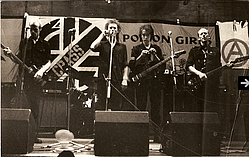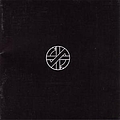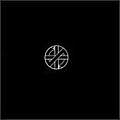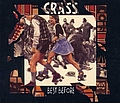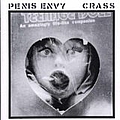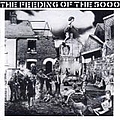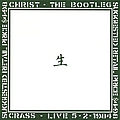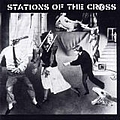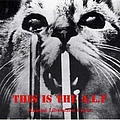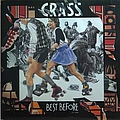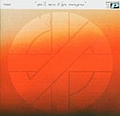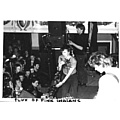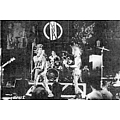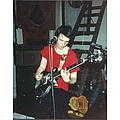Crass Biography
Crass were an English anarcho-punk band, formed in 1977 and based around Dial House, an open house community near Epping, Essex, England. In contrast to The Sex Pistols 'anarchy', Crass' attitude was more directly influenced by libertarian socialist philosophy and anarchism's nineteenth century roots. In the process they promoted anarchism as a legitimate political ideology, way of living, and as a resistance movement, popularizing the seminal peace punk movement and touching on such overtly political issues as anti-consumerism, direct action, feminism, pacifism, anti-corporatism, environmentalism, anti-globalization, anti-racism, religious power, and squatting. Taking literally the punk manifesto of "Do It Yourself", Crass combined the use of sound collage, graphics, song, film, and subversion to launch a sustained and innovative critical broadside against all that they saw as a culture built on foundations of war, violence, sexism, prejudice, capitalism, religious hypocrisy and unthinking consumerism. They were also critical of what they perceived as the flaws of the punk movement itself, as well as wider youth culture in general. Crass were amongst the progenitors of the anarcho-pacifism that became common in the punk music scene. Origins of the band: The band came together when Dial House founder and former member of avant-garde performance art groups EXIT and Ceres Confusion Penny Rimbaud (real name Jerry Ratter) began jamming with Clash fan Steve Ignorant (real name Steve Williams), who was staying at the house at the time. Between them they put together the songs "So What?" and "Do They Owe Us a Living?" as a drums and vocals duo. For a (very) short period of time they called themselves Stormtrooper, before choosing the name Crass, a reference to the David Bowie song "Ziggy Stardust" (specifically the line "The kids was just crass"). Other friends and members of the household began to join in, including Joy De Vivre, Pete Wright, Andy Palmer, Steve Herman and Eve Libertine (originally "the Band's first fan"), and it was not long before Crass performed their first live gig as part of a squatted street festival at Huntley Street, North London. Here they had intended to play a set of five songs; however, the "plug was pulled" on them by a neighbor after three. Guitarist Steve Herman shortly afterwards left the band to be replaced by Phil Clancey, who adopted the alias Phil Free. Other early Crass gigs included a four date tour of New York as well as regularly playing alongside the UK Subs at the White Lion pub in Putney. These latter performances were often not well-attended; "The audience consisted mostly of us when the Subs played and the Subs when we played." Crass also played at the legendary Roxy punk club in London's Covent Garden area. By the band's own account this was a drunken debacle, ending in the group being ejected from the stage, and immortalized by their song "Banned From The Roxy" and Rimbaud's essay Crass at the Roxy. Following this incident the band decided to take themselves more seriously, particularly paying more attention to their presentation. As well as avoiding drugs such as alcohol or cannabis before gigs, they also adopted a policy of wearing black, military surplus-style clothing at all times, whether on or off stage. They introduced their distinctive stage backdrop, a logo designed by Rimbaud's friend Dave King (later of sleeping dogs lie). This gave the band a militaristic image, which led some to accuse them of fascism. Crass countered that their uniform appearance was intended to be a statement against the "cult of personality", so that, in contrast to the norm for many rock bands, no member would be identified as the 'leader'. The aforementioned logo represented an amalgamation of several "icons of authority" including the Christian Cross, the swastika and the Union Flag combined with a two headed snake consuming itself (to symbolize the idea that power will eventually destroy itself). Using such deliberately mixed messages was part of Crass' strategy of presenting themselves as a "barrage of contradictions", which also included using loud, aggressive music to promote a pacifist message, and was in part a reference to their own Dadaist and performance art backgrounds. The band eschewed any elaborate stage lighting during live sets, instead preferring to be illuminated by simple 40 watt household light bulbs (the technical difficulties of filming under such lighting conditions in part explains why there is such little live footage of Crass in existence). The band pioneered multimedia presentation techniques, fully utilizing video technology and using back-projected films and video collages made by Mick Duffield and Gee Vaucher to enhance their performances. Crass Records: Crass' first release was The Feeding of the 5000, an 18 track 12" 45 rpm EP on the Small Wonder label in 1978. Workers at the pressing plant initially refused to handle it due to the allegedly blasphemous content of the song "Reality Asylum". The record was eventually released with this track removed and replaced by two minutes of silence, ironically titled "The Sound Of Free Speech". This incident prompted Crass to set up their own independent record label, Crass Records, in order to retain full editorial control over their material. "Reality Asylum" was shortly afterwards released on Crass Records in a re-recorded and extended form as a 7" single. Later pressings of the album (also on Crass Records) restored the original version of the missing track. As well as their own material, Crass Records released recordings by other performers, the first of which was the 1980 single "You Can be You" by Honey Bane, a teenage girl who was staying at Dial House whilst on the run from a children's home. Other artists included Zounds, Flux of Pink Indians, Omega Tribe, Crucifix, Rudimentary Peni, Conflict, Icelandic band KUKL (who included singer Björk), classical singer Jane Gregory, Anthrax, Lack of Knowledge and the Poison Girls, a like-minded band who worked closely with Crass for several years. Crass Records also put out three editions of Bullshit Detector, compilations of demos and rough recordings which had been sent to the band, and which they felt represented the D.I.Y. punk ethic. The catalog numbers of Crass Records releases were intended to represent a countdown to the year 1984 (eg, 521984 meaning "five years until 1984"), both the year that Crass stated that they would split up, and a date charged with significance in the anti-authoritarian calendar due to George Orwell's novel of the same name. Subsequent Releases The second Crass Album, Stations of the Crass, was released in 1979 and was an ambitious double album featuring three sides of new material and a live side from a gig at the Pied Bull in Islington. Stations saw the band beginning to experiment with new sounds and styles whilst maintaining a heavy punk aesthetic. Crass released their third album Penis Envy in 1981. This marked a departure from the 'hardcore punk' image that Feeding of the 5000 and Stations of the Crass had to some extent given the group. It featured more complex musical arrangements and exclusively female vocals provided by Eve Libertine and Joy De Vivre (although Steve Ignorant remained a group member and is credited on the record sleeve as "not on this recording"). The album addressed feminist issues and once again attacked the institutions of 'the system' such as marriage and sexual repression. One track, a deliberately saccharine parody of a 'MOR' love song entitled "Our Wedding", was given away as a flexi disc with 'Loving', a teenage girl's romance magazine having been offered it by an organization calling itself "Creative Recording And Sound Services" (note the initials). A minor tabloid controversy resulted once the hoax was revealed, with the News of the World going so far as to state that the album's title was "too obscene to print". The band's fourth LP, 1982's double set Christ The Album, was certainly the band's most ambitious project: featuring not just two sides of new songs floating between the softer, layered, sound of Penis Envy and the more classic punk sound of their earlier work, but also two live sides (all of which were heavily interspersed with tape loops, media samples and other studio innovations). The LP came with the - by now ubiquitous - collection of posters and other artwork, and also featured essays by three band members on issues such as education, pacifism, and the failures (and successes) of the punk and hippie movements. Christ The Album took over a year to record, produce and mix, during which time the Falklands War had broken out and ended. This caused Crass to fundamentally question their approach to making records. As a group whose primary purpose was political commentary, they felt they had been overtaken and made to appear redundant by real world events. Subsequent releases, including the singles "How Does it Feel to be the Mother of a Thousand Dead" and "
Top Crass Lyrics
Write a comment
What do you think about Crass? Let us know in the comments below!
Crass Albums
Similar artists
- ConflictPunk
- Rudimentary PeniPunk
- SubhumansHardcore/Punk
- ZoundsPunk
- Aus RottenHardcore/Punk
- DirtPunk
- AntischismHardcore/Punk
- A//PoliticalPunk
- NauseaHardcore/Punk
